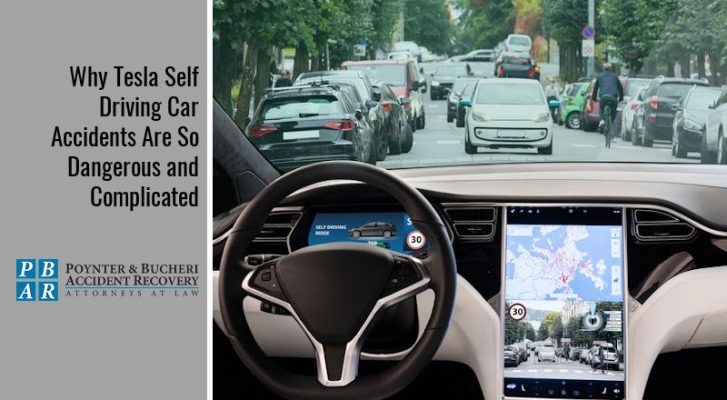
Why Tesla Self Driving Car Accidents Are So Dangerous and Complicated

By 2035, the United States is projected to have 4.5 million self driving vehicles on the road. This is an exciting prospect, and self driving vehicles can improve lives. There are many potential advantages to self driving cars:
- According to the Center for Sustainable Systems (run by The University of Michigan), as of 2020, 94% of crashes in the U.S. were attributed to human error. In a perfect scenario, self-driving vehicles could reduce crashes by 90%.
- Traffic efficiency is expected to be higher when we all have self-driving cars.
- Autonomous vehicles are expected to operate on clean energy, so their widespread adoption would reduce carbon and greenhouse gas emissions.
- Travel for populations who cannot drive themselves (such as the elderly or the disabled) could be made possible. For example, researchers at Indiana’s Purdue University recently won a U.S. Department of Transportation competition to develop ramp-equipped autonomous vehicles to drive people with disabilities.
Tesla Self Driving Car Accidents: What Are The Dangers of Self Driving Cars?
We know that the technology is not perfect yet, so how are self driving cars dangerous? Research has shown that Tesla self driving car accidents can also occur as a result of a fault with the algorithms that train the vehicles.
- For example, a fatal accident involving a Tesla happened in 2016 in Florida. The Tesla drove (at full speed) straight into the side of an 18-wheeler that crossed the highway; the car didn’t brake automatically because it couldn’t “distinguish the white side of the truck against the brightly lit sky,” according to The National Law Review. After an investigation, the NHTSA said that the Tesla driver (who died in the accident) was at fault because if he had been paying attention, he would have had time to brake.
- Another problem with design algorithms is that self-driving vehicles seem to have a difficult time recognizing pedestrians with darker skin tones. A 2019 Georgia Tech study found that the accuracy of autonomous vehicles’ object detection systems was reduced by 5% when encountering pedestrians whose skin colors were the three darkest shades on the Fitzpatrick scale, a fact they described as “uniformly poorer performance.”
- After an Uber AV struck and killed a pedestrian in Tempe, Arizona last year, the National Transportation Safety Board reported that the self-driving vehicle (a Volvo SUV) didn’t react in time because it had been trained to expect and recognize pedestrians only when they were in crosswalks, according to an NPR story.
- Although driver inattention is usually cited in so-called self-driving accidents with Tesla Model 3 and Model S, the NHTSA launched a probe in 2021 to specifically determine issues with Tesla Autopilot and the frequency of collisions with parked emergency vehicles. This probe was upgraded to be an “Engineering Analysis” Investigation in 2022.
- A recent (February 18, 2023) fatal crash involving a Model S Tesla that struck a fire truck parked at the side of a California Highway is still being investigated.
- Recently, (February 7, 2023) Tesla issued a recall of as many as 362,758 vehicles (Model S, Model X, Model 3, and Model Y) after the NHTSA published concerns about the “Autosteer on City Streets” feature used in certain situations on city streets.
Are Teslas Dangerous?
In short, no. Teslas are not dangerous. But in addition to the accident statistics above, they do pose certain risks including:
- Danger of fire: Lithium batteries are highly combustible and if they are damaged in a collision, there is a risk of explosion or fire.
- False sense of security: When someone is operating a Tesla, they may feel invulnerable. They may ignore their surroundings altogether when they should be paying close attention in case they need to take over the wheel.
- Cyber attacks: A Tesla’s operating system can be hacked by cybercriminals. If this were to happen, the driver would lose control of the vehicle and completely be at the mercy of the hacker.
Tesla self driving car accidents can be complicated and lengthy. Whether the responsibility lies with the other driver or with Tesla itself (or even a combination of the two), you will need an experienced and highly competent car accident lawyer on your side.
Our personal injury attorneys at Poynter & Bucheri Accident Recovery (PBAR) are experienced with cases like yours and can evaluate what your case may be worth. Plus, we charge no attorney fees, unless you win. Call today for a free case review at 1-800-265-9881, or contact us online.
